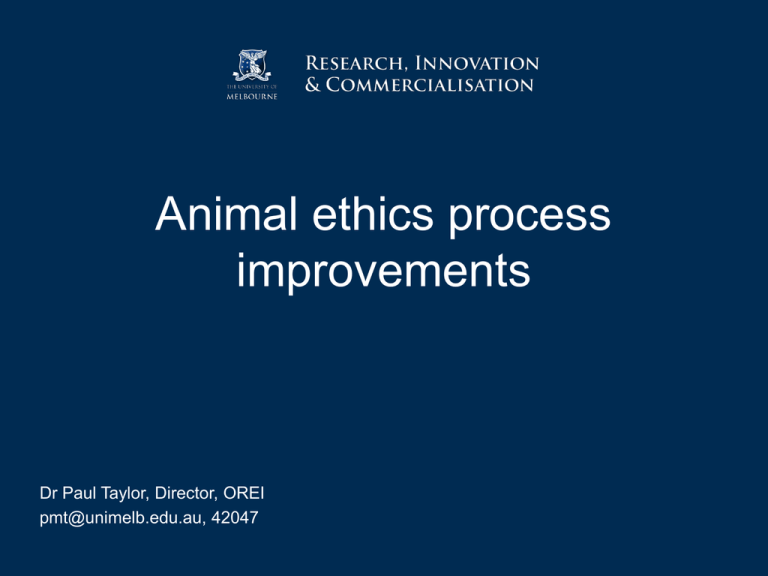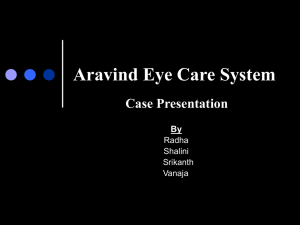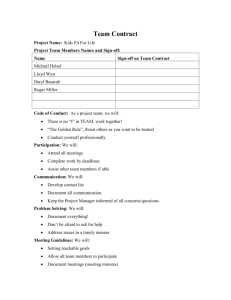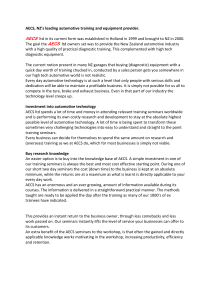Revised amendment process
advertisement

Animal ethics process improvements Dr Paul Taylor, Director, OREI pmt@unimelb.edu.au, 42047 Overview • A note on metrics • New application form and revised governance • New amendments process • Other changes • Shepherds • Conditions • Standards • Committees Metrics BIP Metrics were wrong • “2% first pass approval rate for ethics processes” • “marquis” metric • Took the number of outright approvals assessed in 2013 and divided by total number of applications and amendments assessed • Did not consider ‘approved – contingent’ as approval even though work can begin Revised metrics for new applications • First pass approval rates = number of applications authorised to commence / number of new applications 35% for 2013 across all AECs Revised metrics for amendments • First pass approval rates (amendments) = number of amendments authorised to commence / number of amendments 63% in 2013 across all AECs Comparisons • In 2014, USyd reported 59% first pass approval* rate for animal ethics applications • There is (always) room for improvement • What can we learn from them? * Calculated as authorised to commence work Reminder of BIP recommendations Summary of BIP recommendations • Revised application form • Reduced governance (sign-off) • Poor systems infrastructure • Committee membership New application form and governance Governance Now From June 18 •Sign-off in Themis from all named •Sign-off only required by PI investigators required prior to •Other named investigators notified at submission submission and approval providing •“Work-arounds” – either OREI opportunity to confirm their approves or waits until all signed off involvement with PI before issuing approval •Allows identification of applications •Takes 14 days on average that you are named in ✔ Current application form • Clunky, repetitive, difficult to navigate, repetitive • Difficult to share/collaborate • 36 questions over 18 screens • Sequence of questions in Themis does not map to sequence in output…difficult to construct argument • In 2013 for Biochem AEC, 29% of applications were returned because of problems with Project Description Principles of the new form • Ask for information once • Ask only relevant questions • Enable sharing and ease of use (sticking in pictures, flow charts, timelines) • Compliant with Code requirements and principles • Allow an argument to be constructed… “this research needs to done because it matters, the benefits are potentially good. The impacts on the animals have been minimised. The benefits of the research outweigh the risks or impacts on the animals” New application process/form • 6 screens in Themis plus 20 questions in a Word document • Much easier to share/collaborate • Much easier to add images and figures • Simplified questions in a logical order • Asks for information only once • Feedback from consultation was generally very positive • One form for all application types • Allows a ‘story’ to be told ✔ 1. Application details 2. Animals requested 3. Personnel 4. Attachments 5. Lodgement 6. Confirmation Quick tour of the new form… New application process from June 18 • Final version of the application form will be made available soon • Also providing guidance on how to complete it • Also providing a range of templates covering different sorts of research • No more paper copies to deliver! New amendment process Revised amendment process • Simplified form needs a simplified amendment process • One pager that allows for speedy processing of new investigators, some increases in animal numbers, extensions of time etc • Clarify what can be an amendment and what needs to be a new application • Details coming soon… Other process improvements Shepherds • Improving interaction between researchers and committee members • Shepherds allocated for each application • Encouraged to contact to researcher to clarify technical questions or inconsistencies in the application • Allows for these to be reported back at the meeting rather than as matters to follow up afterwards ✔ Conditions • We can make better use of conditions of approval • So, instead of asking for clarification or additional information and where there is a reason, an application could approved with specific conditions. • Application mentions use of both 21 and 17 gauge needles. AEC’s view is that 21 is acceptable but 17 is not. Approval provided on the condition that only 21 gauge needles are used. No further interaction required… ✔ Standards • Guidelines for best practice in common techniques (e.g. anaesthesia, micro pumps) • Developed with input from researchers; lots of consultation • Mandatory requirements plus areas where there is flexibility will be highlighted • Staged introduction • Useful for both researchers and AEC members in understanding expectations and procedures used ✔ Committee membership • Statutory requirement for only 4 members; some AECs had up to 15 members • Adding to complexity of review? • Now, 3 out of 4 AECs have 8 members (4th to follow soon) • Calling for expressions of interest for new members in all categories soon ✔ Overview BIP Recommendation Status Delivery date Revised application form Complete June 18 Reduced governance (sign-off) Complete June 18 Poor systems infrastructure Underway Committee membership Underway For 2016 Other (non-BIP) activities Underway From August meetings Comments ✔ ✔ IT project to identify suitable alternative Recruitment drive to commence soon. Numbers already reduced We’ve listened, we’re listening and we’re doing • June 18 is a big day! • 20 questions and 6 screens cf 36 questions over 18 screens • Expect that these changes will result in faster ethics approvals • Broader system changes (or a new system) would allow for further increases in efficiency (for example, in comms between AEC members and researchers, immediate feedback) • Application quality is a key factor in determining outcome • Comments and suggestions always welcome to animalethics@unimelb.edu.au or pmt@unimelb.edu.au Acknowledgements • Dr Daniel Barr, Sebastian Gimenez, Tim Anning, Faye Bulled, Lei Shong Lau • Strategy& • Research Chancellery • AECs and AWEC • Academic contributors to workshops and all who provided comment on consultation documents


